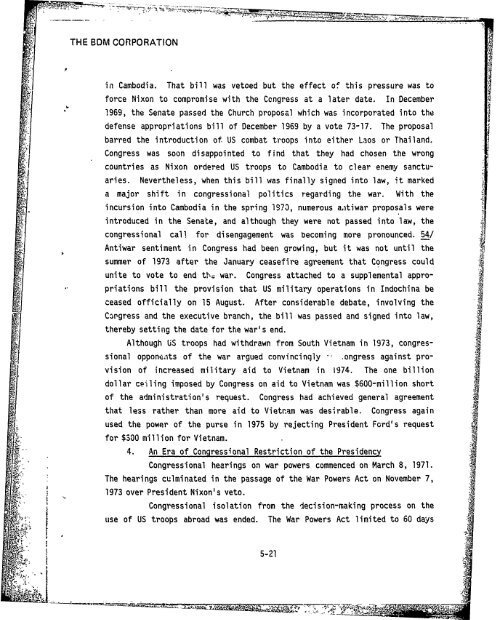policy - The Black Vault
policy - The Black Vault
policy - The Black Vault
Create successful ePaper yourself
Turn your PDF publications into a flip-book with our unique Google optimized e-Paper software.
THE BDM CORPORATION<br />
YI<br />
WI<br />
in Cambodia. That bill was vetoed but the effect of this pressure was to<br />
force Nixon to compromise with the Congress at a later date. In December<br />
1969, the Senate passed the Church proposal which was incorporated into the<br />
defense appropriations bill of December 1969 by a vote 73-17.<br />
barred the introduction of US<br />
Congress was<br />
<strong>The</strong> proposal<br />
combat troops into either Laos or Thailand.<br />
soon disappointed to find that they had chosen the wrong<br />
countries as Nixon ordered US<br />
troops to Cambodia to clear enemy sanctuaries.<br />
Nevertheless, when this bill was finally signed into law, it marked<br />
a major shift in congressional politics regarding the war. With the<br />
incursion into Cambodia in the spring 1973,<br />
numerous aotiwar proposals were<br />
introduced in the Senate, and although they were not passed into law, the<br />
congressional call for disengagement was becoming more pronounced. 54/<br />
Antiwar sentiment in Congress had been growing, but it was not until the<br />
summer of 1973 after the January ceasefire agreement that Congress could<br />
unite to vote to end tk, war.<br />
Congress attached to a supplemental appropriations<br />
bill the provision that US military operations in Indochina be<br />
ceased officially on 15 August.<br />
After considerable debate, involving the<br />
C3rgress and the executive branch, the bill was passed and signed into law,<br />
thereby setting the date for the war's end.<br />
Although US troops had withdrawn from South Vietnam in 1973, congressional<br />
opponents of the war argued convincinqly -- .ongress against provision<br />
of increased military aid to Vietnam in 1974. <strong>The</strong> one billion<br />
dollar ceiling imposed by Congress on aid to Vietnam was $600-million short<br />
of the administration's request.<br />
Congress had achieved general agreement<br />
that less rather than more aid to Vietnam was desirable. Congress again<br />
used the power of the purse in 1975 by rejecting President Ford's request<br />
for $300 million for Vietnam.<br />
4. An Era of Congressional Restriction of the Presidency<br />
Congressional hearings on war powers commenced on March 8, 1971.<br />
<strong>The</strong> hearings culminated in the passage of the War Powers Act on November 7,<br />
1973 over President Nixon's veto.<br />
Congressional isolation from the decision-making process on the<br />
use of US troops abroad was ended. <strong>The</strong> War Powers Act limited to 60 days<br />
5-21
















